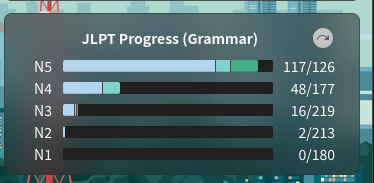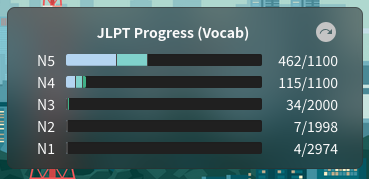Hi Bunnypros 
I go by Synerin and I’ve been studying Japanese since October, so about 8 months now. When I say it out loud, it doesn’t sound like a lot of time, but I’ve had a really fun journey so far! When I was younger, I tried to learn Japanese a handful of times, but I never persevered past hiragana and katakana. I didn’t necessarily want to learn Japanese; I wanted to know Japanese. But these last 8 months of learning have been so rewarding!
Two months into studying, I took a vacation in Hawaii for a week. I didn’t realize that it’s such a popular destination for Japanese tourists, but I saw katakana everywhere! It was so cool to be able to use the little Japanese I knew in a practical way! Usually the signs were also in English, but I’ll take it you know  .
.
I think the biggest thing that has helped me in my studies so far is taking an actual Japanese class through a local school’s program. Each class meets online for 2 1/2 hours once a week for 10 weeks, usually covering about 2 chapters of Genki. I know it doesn’t sound like much for that amount of time, but I find that it helps keep me consistent and lets me practice my speaking in a more comfortable environment. My teacher is also a native speaker, so it’s nice to be able to ask questions about the nuance of a word or the culture of Japan.
Besides the class, I’ve been going through the Kaishi 1.5k deck on Anki and using Bunpro of course! I started off with 5 new Anki cards a day, since 10 seemed like too much, and these days I do 7. I also watch videos on different grammar points or just to practice listening, though I should do that more often than I am  .
.
I hope to take the N5 in December, and from there I’ve been thinking that I might like to go to a language school in Japan. I suppose I could try to get a job with an international company based in Japan instead, and continue learning Japanese outside of work, but that doesn’t sound as fun truth be told. Admittedly I am very indecisive and get nervous about big decisions like this  .
.
I’m wondering what other people are doing in their (more or less) semi-casual journeys with Japanese? Are you interested in going to a language school, or do you want to work in Japan? Have you made any small changes that had a bigger impact than you expected? This one is pretty small, but for me I switched from Hint level 2 on Bunpro to Hint level 1. It makes me think a lot more about the sentence and how it’s structured instead of just thinking “okay this means ‘Is this your room?’ great cool makes sense.”
thamks c:

 )
)

